-
fb777 EcoWaste tells Marcos: Waste-to-energy won’t solve flooding
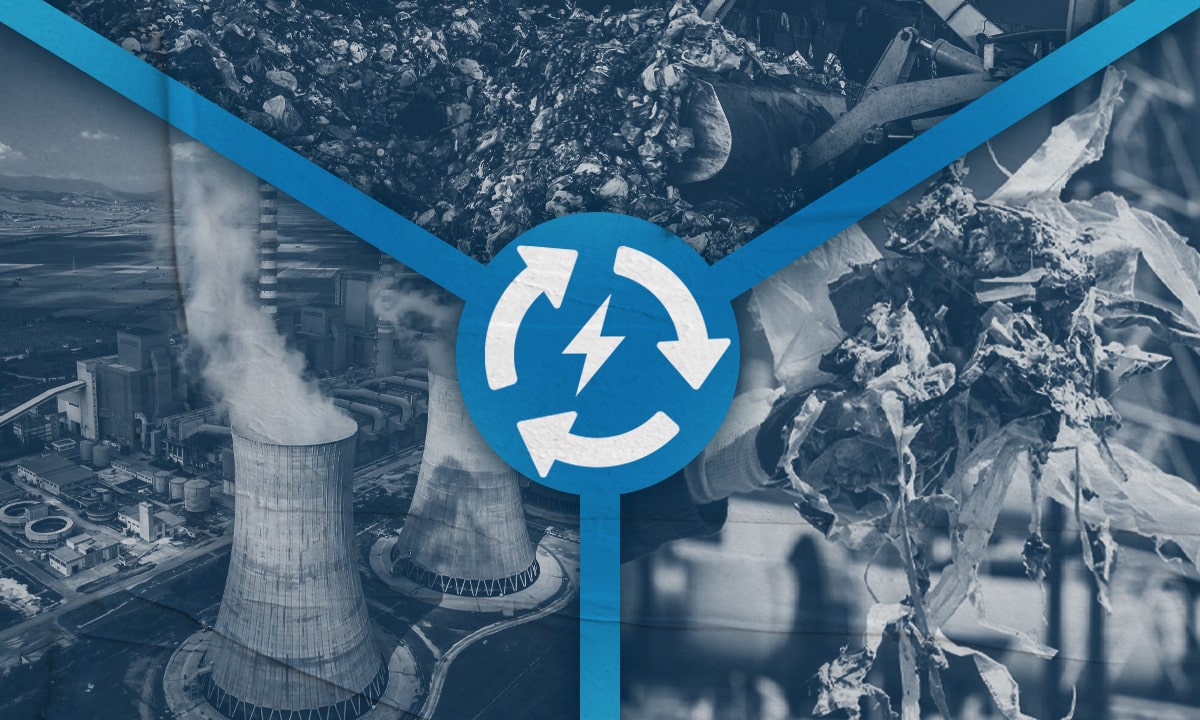
WASTE TO ENERGY composite image from Inquirer file and stock photos
MANILA, Philippines—Relentless rains and cyclones in past months have submerged various parts of the country in floods, prompting the President to promote waste-to-energy (WTE) as a fix.
Environmentalists, however, aren’t convinced.
Article continues after this advertisementFor years, WTE — the process of converting waste into energy in the form of electricity or heat — has been a contentious issue in the country.
FEATURED STORIES NEWSINFO Kristine now a tropical storm; Signal No. 1 up in 24 areas nationwide NEWSINFO Walang Pasok: Class suspensions on Tuesday, Oct. 22 NEWSINFO Sandro Marcos calls out VP Sara Duterte: ‘You crossed the line’Several bills promoting WTE have been filed, with one already approved on third reading by the House of Representatives, while another, the Senate version, remains pending on second reading.
Recently, President Ferdinand Marcos Jr. voiced his support for the swift passage of the WTE bill, emphasizing its potential to help mitigate the country’s persistent flooding problem.
Article continues after this advertisementMarcos also stressed that the WTE bill is crucial in flood control “because the garbage problem is actually severe.” He claimed that WTE projects have reduced flooding by 40 percent, noting that it has to be implemented at the local government level.
Article continues after this advertisement“I think waste-to-energy now has taken on a new role. It is no longer just for garbage, or waste disposal or waste management. It is also now very much part of the flood control effort,” he said.
Article continues after this advertisementREAD: Marcos wants immediate passage of Waste-to-Energy bill
While EcoWaste Coalition acknowledged poor waste management as a major contributor to the country’s flooding woes, they argued that incinerating municipal waste through WTE would not solve the issue and could pose health risks.
Article continues after this advertisement ’Not waste buildup alone’“Flooding in the Philippines is primarily a result of poor urban planning, deforestation, clogged waterways, and inadequate drainage systems — not waste buildup alone,” EcoWaste Coalition said in a statement.
The group also pointed out that the country’s continued production and use of single-use plastics is a crucial factor exacerbating waste and flooding issues.
READ: Risks loom as worsening garbage mess pushes deep PH dive into waste-to-energy
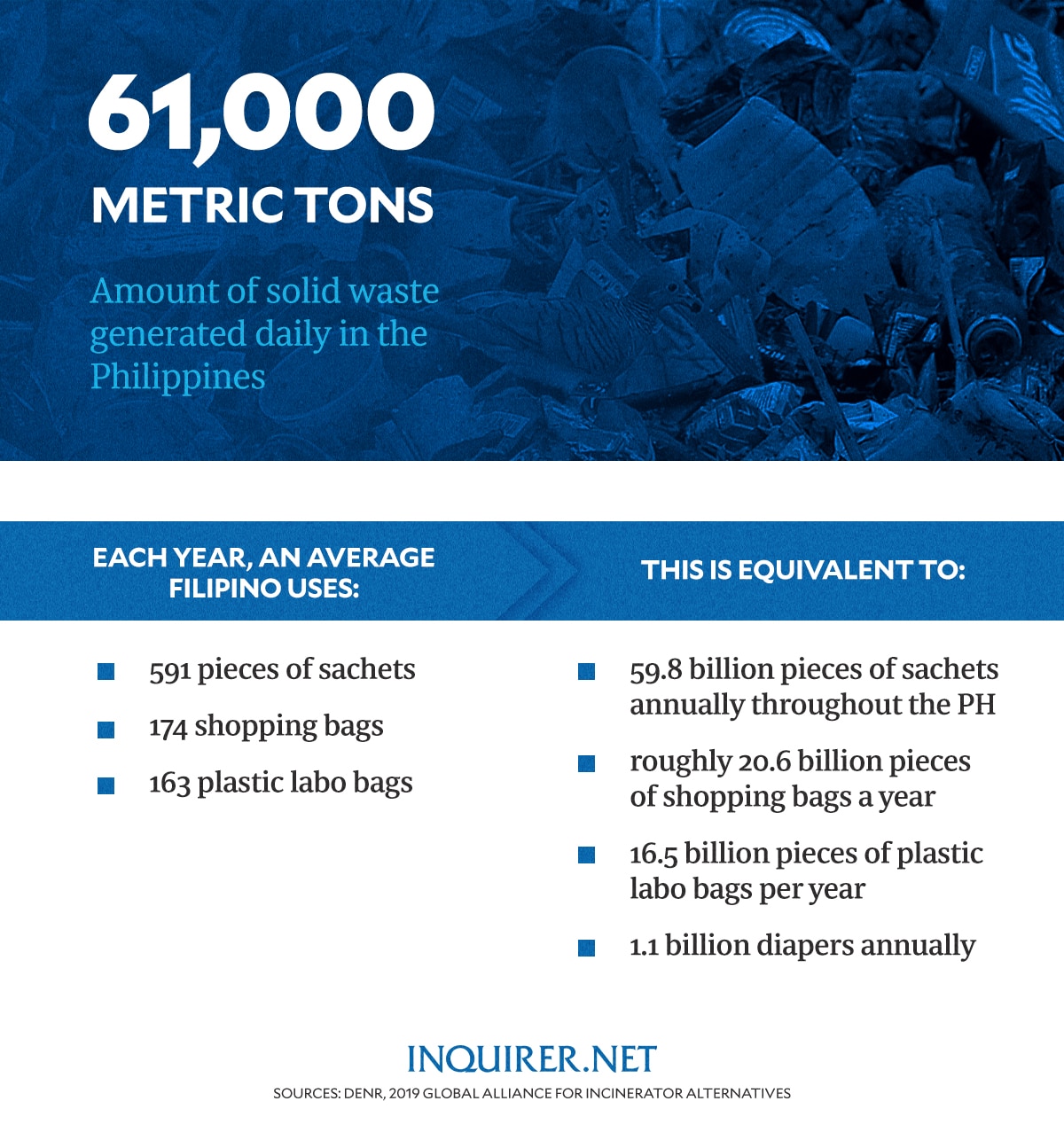
GRAPHIC: Ed Lustan / INQUIRER.net
The Global Alliance for Incinerator Alternatives (GAIA) reported that the average Filipino uses 591 sachets, 174 shopping bags, and 163 plastic labo bags each year.
This results in a massive accumulation of plastic waste across the Philippines, amounting to:
59.8 billion pieces of sachets annually throughout the PH roughly 20.6 billion pieces of shopping bags a year 16.5 billion pieces of plastic labo bags per year 1.1 billion diapers annuallyA peer-reviewed study by Ocean Cleanup, a Netherlands-based environmental engineering NGO, revealed that in 2019, the Philippines accounted for the largest share of global plastic waste dumped into the ocean, contributing at least 36.38 percent of the world’s plastic pollution.
“These materials dominate waste streams, clogging drainage systems and waterways, leading to severe flooding in urban areas. Rather than relying on WTE, we must shift towards reducing plastic production, promoting reuse, and phasing out single-use plastics,” said EcoWaste Coalition.
The group emphasized that proper waste management, as outlined in Republic Act No. 9003 or the Ecological Solid Waste Management Act of 2000, should take precedence over waste incineration.
The law mandates the segregation, collection, and disposal of waste through environmentally sound methods such as recycling, composting, and material recovery facilities (MRFs).
READ: IN THE KNOW
They argue that focusing on this approach would help establish a circular economy that reduces waste generation at the source.
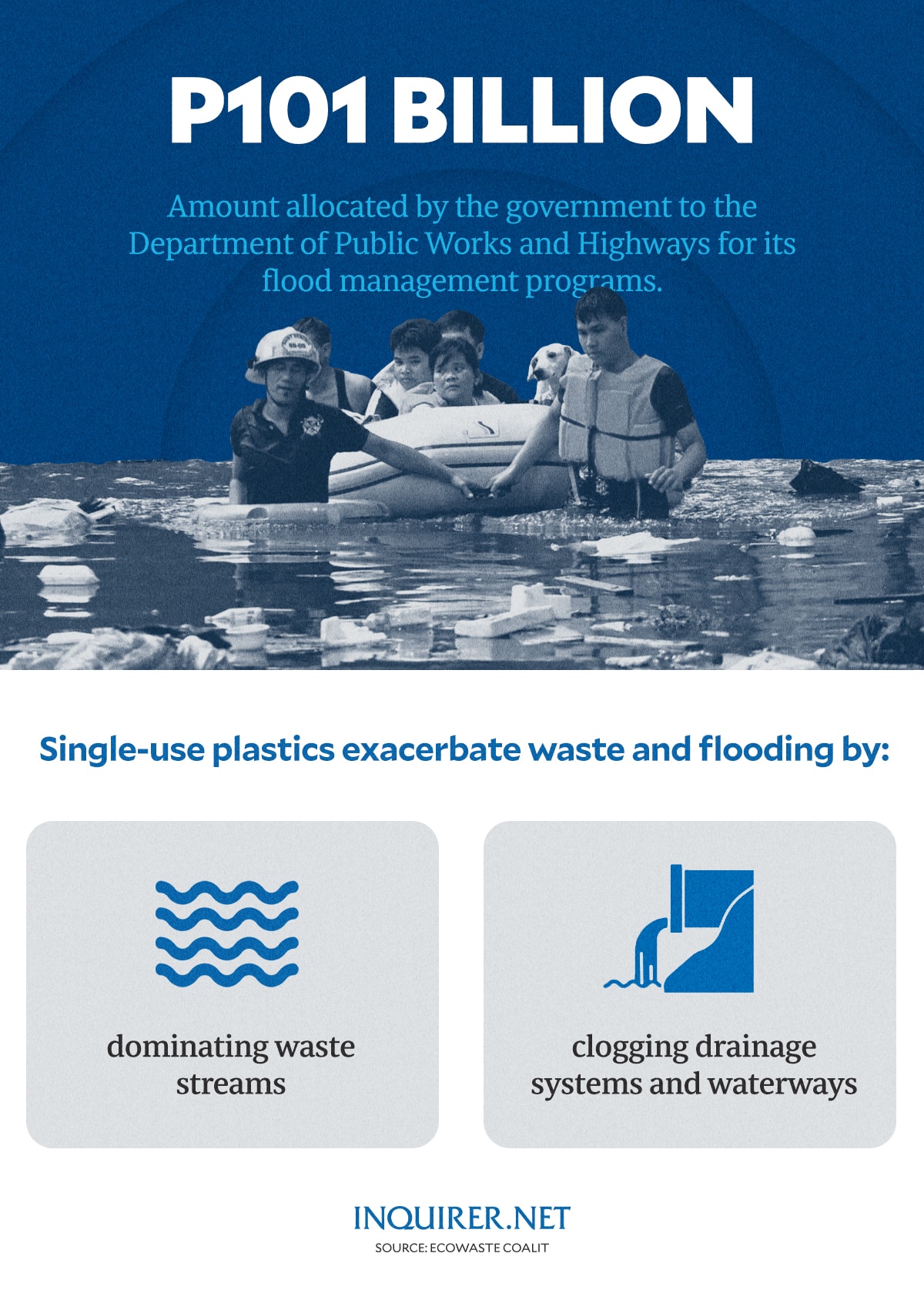
GRAPHIC: Ed Lustan / INQUIRER.net
Last year, the Commission on Audit (COA) found that despite RA 9003’s emphasis on ecological practices like recycling and composting, local government units (LGUs) have been slow to implement solid waste management plans
READ: Running out of landfills
“WTE facilities cannot prevent floods caused by silted rivers or insufficient drainage infrastructure despite large budget allotments for their construction,” EcoWaste Coalition said.
They noted that in 2021 alone, the government allocated P101 billion to the Department of Public Works and Highways (DPWH) for flood management programs “[y]et, the floods persist.”
“Where is the accountability for these funds? What tangible progress has been made in improving drainage and reinforcing our waterways? We should focus on ensuring transparency and efficacy in flood control programs, not resorting to quick fixes like WtE which can lead to more destruction of the environment,” the group said.
Burning wastesIn the ongoing discussions about WTE, the Department of Environment and Natural Resources (DENR) has described it as a “cleaner and more suitable alternative” to traditional sanitary landfills, the primary waste disposal method allowed under RA 9003.
However, this position has raised concerns among experts, as several studies have highlighted the potential environmental risks and harm associated with WTE technologies.
WTE converts waste into energy through various processes, such as incineration, which burns waste to generate heat or electricity, and anaerobic digestion, which breaks down organic waste to produce biogas as fuel.
Advanced techniques like gasification and pyrolysis use high temperatures to transform waste into synthetic gas (syngas) that can also be burned for energy.
EcoWaste Coalition contends that WTE, which relies on burning materials that could be recycled or composted, clearly contradicts the principles of RA 9003.
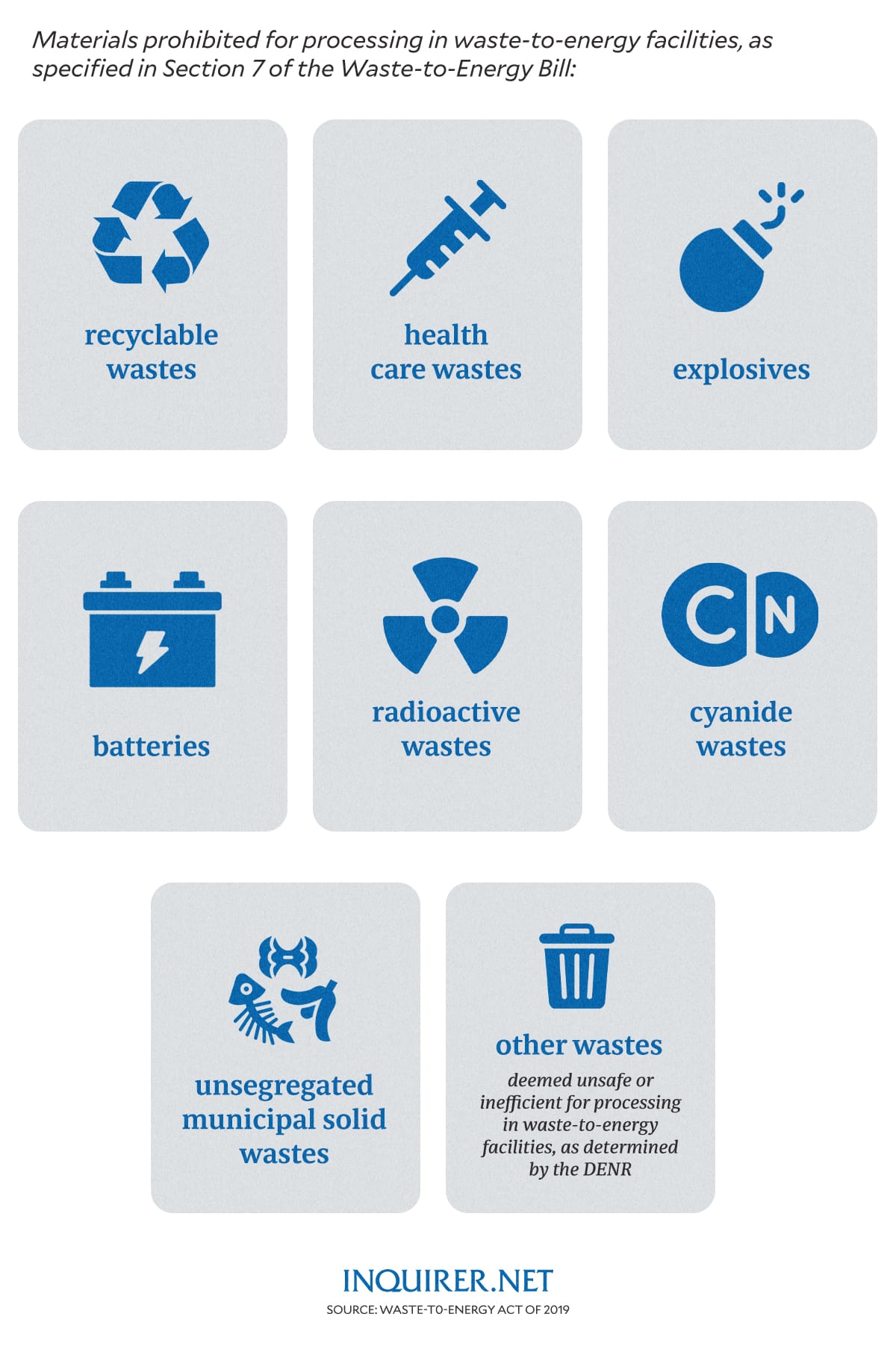
GRAPHIC: Ed Lustan / INQUIRER.net
Section 7 of the Waste-to-Energy Act of 2019 lists materials prohibited from being processed in WTE facilities, including:
recyclable wastes health care wastes explosives batteries radioactive wastes cyanide wastes unsegregated municipal solid wastes other wastes deemed unsafe or inefficient for processing in WTE facilities, as determined by the DENRIt’s important to note that of the 61,000 metric tons of waste generated daily in the Philippines, much of it could potentially be recycled or composted, according to EcoWaste Coalition and other environmental groups — rendering it unsuitable for WTE facilities.
Data from the National Solid Waste Management Commission (NSWMC) in 2015 showed that recyclable wastes — such as paper, plastics, metals, glass, textiles, and more — made up 27.78 percent of the country’s waste composition, a larger share than residual wastes (17.98 percent), which are typically used in WTE facilities.
Health risksDespite the government-backed push for WTE technology in the country, Baguio City Mayor Benjamin Magalong recently decided to abandon plans for WTE projects in the city.
Magalong, who had previously considered WTE as the primary solution to Baguio’s waste problem, changed course after listening to a lecture by zero-waste expert Jorge Emmanuel.
The lecture highlighted the dangers of dioxins and furans — highly toxic byproducts of incinerators and even the most advanced thermal power plants in Europe.
READ: Waste-to-energy projects in Baguio to be scrapped
The local government concluded that WTE, due to its potentially harmful effects on Baguio’s air quality and environment, is not a viable long-term solution for the city’s waste problems. Instead, they chose to prioritize proper waste management in line with Republic Act No. 9003, focusing on more sustainable approaches.
In a roundtable discussion hosted by renowned marine conservation organization Oceana last June, Emmanuel explained that dioxins — dubbed as the most toxic chemical pollutant known to science — can be inhaled by people living near WTE plants.
READ: Waste-to-energy: The perils for human health, environment
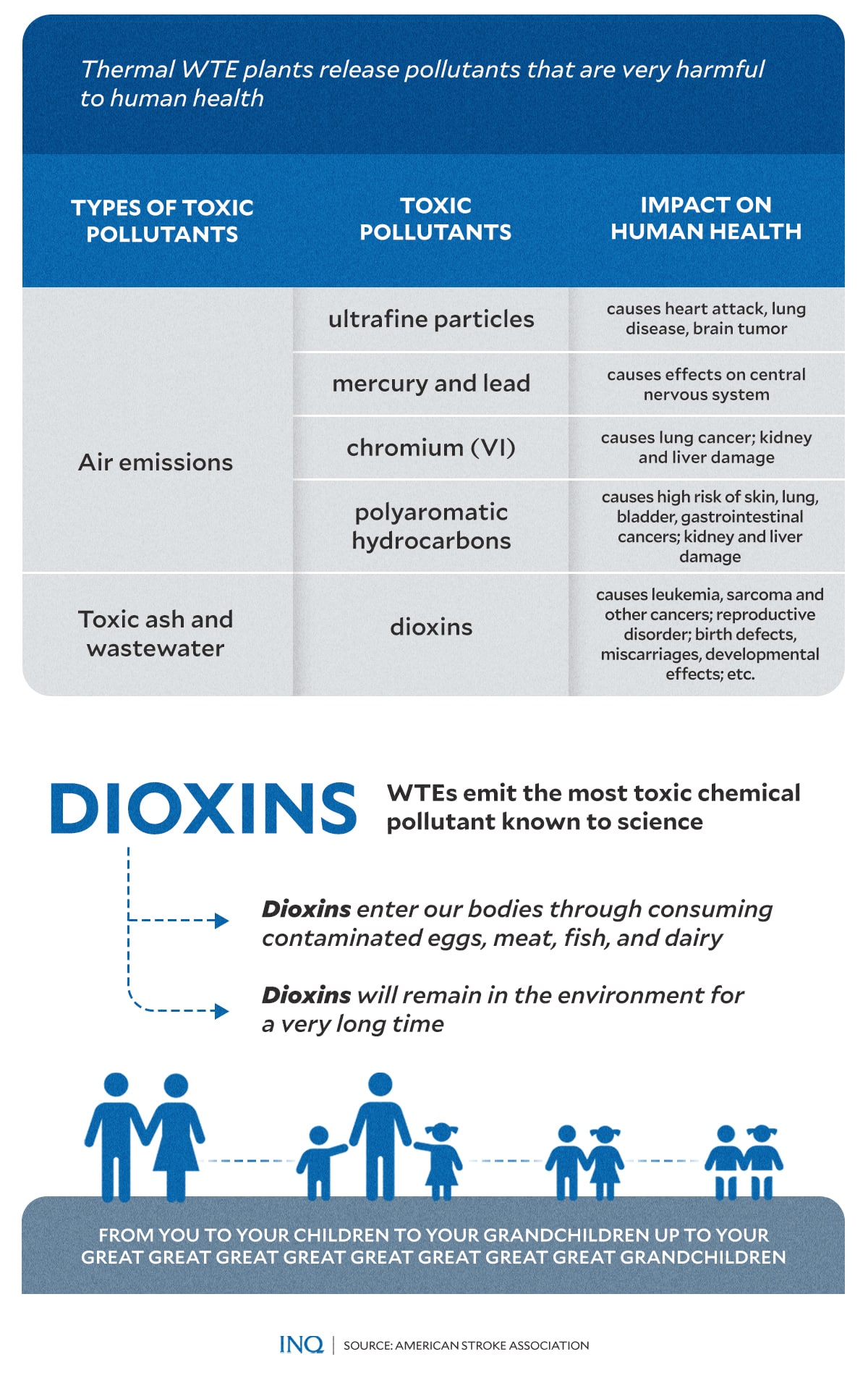
GRAPHIC: Ed Lustan / INQUIRER.net
These chemicals can also enter the human body after consumption of contaminated eggs, meat, fish, and other dairy products containing a bio-concentrated amount. Among the health effects associated with dioxins are:
cancers (such as soft-tissue sarcoma, respiratory cancer, prostate cancer, Non-Hodgkin’s lymphoma, and chronic lymphocytic leukemia) male reproductive effects (low sperm count, abnormal testis, reduced size of genital organs, lower testosterone levels) female reproductive effects (decreased fertility, ovarian dysfunction, endometriosis, hormonal changes) birth defects miscarriages developmental effects on children (including alteration in reproductive systems and impact on child’s learning ability and attention)In 2020, the environmental group Greenpeace found that an estimated 27,000 Filipinos already died from air pollution caused by burning fossil fuels, such as in coal plants, as well as from transport pollution.
“Allowing waste-to-energy (WTE) incinerators to operate will add to the harm and deaths air pollution brings to people,” the group said.
‘Not the right solution’“When you have a technology that has air emissions [that] are very dangerous and affect wildlife, humans, and the environment; when you have wastewater emissions; and you end up with solid waste that’s also hazardous, I cannot imagine why you could call this a ‘clean alternative’,” Emmanuel said.
READ: Waste energy: ‘False solution’
For its part, EcoWaste Coalition urged the national government to follow Baguio’s example, stressing that WTE is not the appropriate solution for managing the country’s waste problem or tackling environmental challenges.
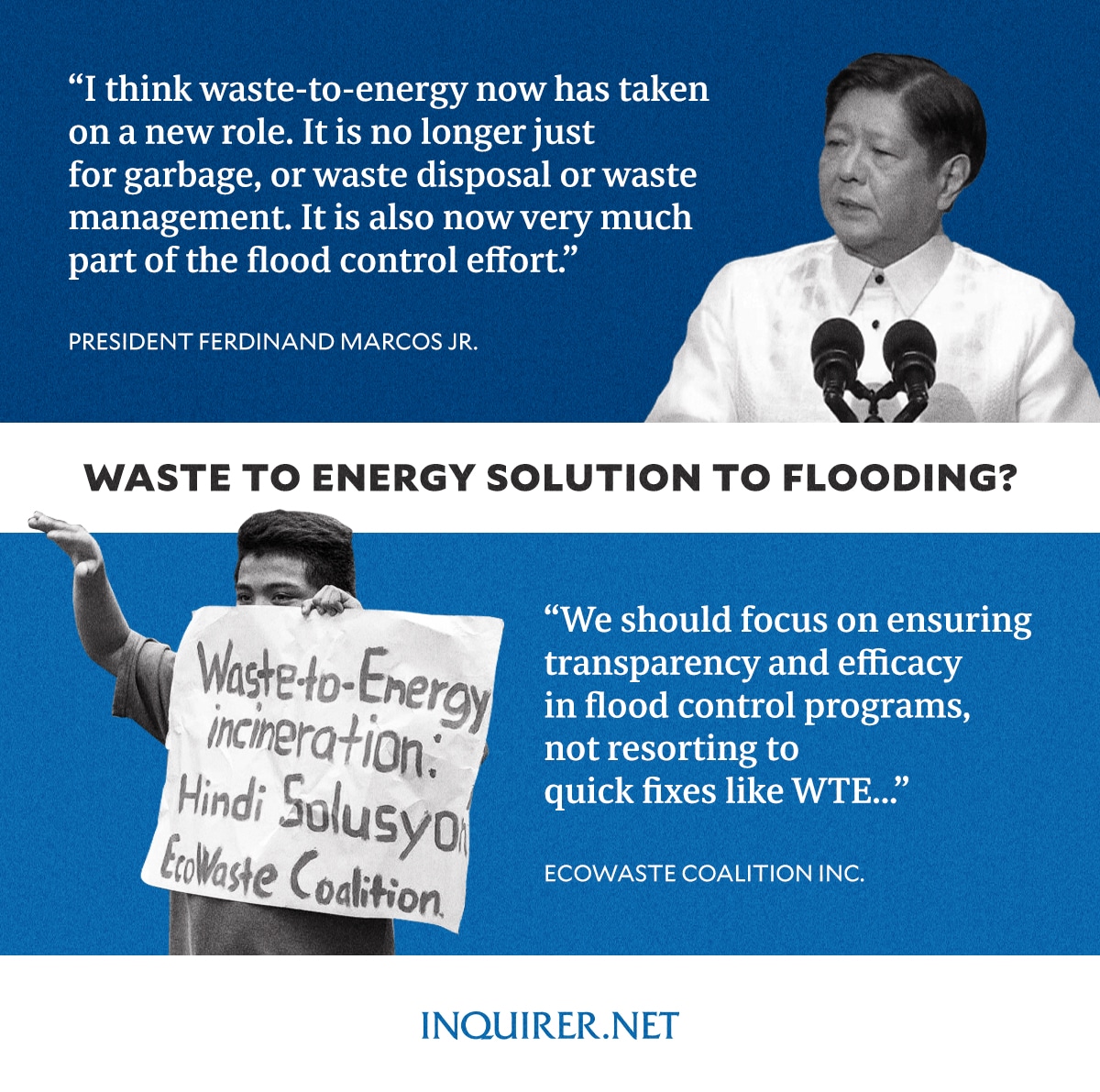
GRAPHIC: Ed Lustan / INQUIRER.net
“[T]he government should invest in more realistic and safe solutions to address the problems in flooding. We need to strongly call for reduction of plastic production and pass bills that strengthen upstream solutions at the national level,” the group said.
“We urge the government to be more mindful in crafting policies, and consider the impacts of their decision-making on both the people and the environment,” it added.
Your subscription could not be saved. Please try again. Your subscription has been successful. Subscribe to our daily newsletter
SIGN ME UP RELATED STORIES: The myths behind waste-to-energy technologies The folly of waste-to-energy incinerationfb777
READ NEXT Kasanggayahan 2024 kicks off in Sorsogon Ejercito hopes House will approve amended Universal Healthcare... EDITORS' PICK PBA Finals a duel between 2 great minds steering 2 great sides Kristine gets nearer; Metro Manila, 42 other areas under Signal No. 1 UPDATES: 2025 elections precampaign stories PVL: Alohi Robins-Hardy set for PH return, joins Farm Fresh Liam Payne had cocaine in his system when he died, says official Alex Eala bounces back at WTA 250 Guangzhou Open MOST READ SC issues TRO vs Comelec resolution on dismissed public officials Garcia to ask PNP for list of private armed groups before 2025 polls LIVE UPDATES: Tropical Storm Kristine AFP reprimands cadet who asked for Marcos wrist watch View comments
